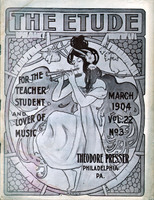BY THALEON BLAKE.
Among many instructors (who deserve saintships on the pedagogic calendar, one and all!) only two succeeded in making a lasting impression upon my unwilling intellect. Strange to relate, these two were not pronounced as to personality, or eccentricity; nor, what is but less in force with youths, did they inspire either affection or fear.
The secret of their power lay in their own thoroughness, earnestness, honesty, and methods of extreme simplicity. Being on fire they could kindle others; they did not have to borrow a living coal from the neighbors. They were pioneers who blazed a trail whose guiding notches are still before me.
I remember it was their pleasure to ask questions —simple, innocent-sounding, but inquisitorial questions. To be readily informed it is but necessary to ask questions; to take the wind out of a braggadocio is an easy matter—with questions.
One of these teachers to whom reference is made was a teacher of science. Whenever a pupil glibly rattled over profound depths in chemistry this quiet gentleman would smile blandly, bow slightly to the wise scholar as if in acknowledgement of such a display of learning, then ask "Why?"
Oh! that terrible, terrible "why!" I hear its dirge knelling in my ears this very moment! If the glib youth could answer that "why" with another copybook statement, a second stumbler always followed. But no one ever got beyond a third "why." After the first week of school the boldest were as lambs in that man's hands. Such diligent digging into fundamental truths, causes, and reasons as his pupils soon displayed in science was unparalleled in that school. They found it to be necessary to know why, as well as how. Thorough preparation for the class became the custom, then the rule, then the habit. No committing to memory of laws sufficed, but the ability to explain and reason about them alone was tolerated. The result was a pupil did not need a natural inclination toward chemistry to learn it. It was impossible not to learn.
The other, a professor of English literature, tripped up the unwary with the stock question, "Are you sure?" Here again all, at first, were sent back to study. Grammars, rhetorics, logics were overhauled by lackadaisical pupils who had suddenly discovered the importance of being sure. While scanning Milton's grand heroics an insignificant question in elementary grammar would be asked, followed by one about hypercatalectic measures, and that by still another referring, perhaps, to the rhetorical form of sentences, all in bewildering rapidity. The performance concluded with the inevitable "Are you sure?" which itself was sure to reseat the unprepared pupils in a twinkling.
This professor would not endure hemming and hawing for a moment. It was "Yes" or "No" with him in practice as well as in theory. To an inexperienced youth who had somewhat prematurely announced his intention of becoming a journalist, and who ventured to reply to several "Are you sures?" with plausible guesses, the master suddenly cried: "Enough! You may write 'stuff' later, but you can't talk nonsense in this class." The thrust went home; the young man, and the class as well, profiting by it.
In the class sessions of these two professors pupils who meant business learned to work with a will; the few laggards dropped out, hopelessly distanced in the race for excellence. I dare say the remainder, in whatever callings they may be working in to-day, are stronger men because of the instruction of these stern realists; when confronted in the world of affairs, or of thought, with searching "whys," or by confounding "Are you sures?" they are not wholly unprepared; they know how to dig for facts, where to go for them, and what to do with them when brought to light: in a word, they are not helpless, because their teachers made them thinkers.
I have but mentioned a manner of bringing home instruction and information to the young. The manner is of worth, it seems to me, in art as well as in science and literature.



